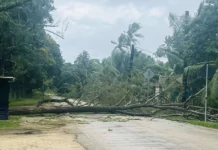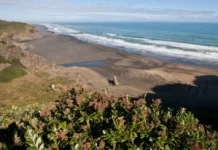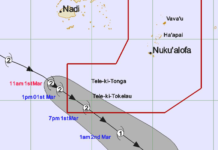By Caleb Fotheringham, RNZ Pacific Journalist, and is republished with permission
A drought has been declared for Tonga’s main island Tongatapu as well as the nearby island of ‘Eua, and authorities have put out warnings and alerts for other islands.

The climate pattern El Niño was officially declared in September by Tonga’s Meteorological Services, that will mean warmer temperatures, less rainfall, and more cyclones for the nation.
Metservice deputy director Laitia Fifita said the drought is not expected to ease anytime soon.
“Looking towards the next three months for the Tonga group it’s still expected that this trend will continue to have below average precipitation or rain fall for our island divisions here in Tonga,” Fifita said.
During El Niño in 2015 and 2016, below average rainfall was also recorded, he said.
However, it is expected that there will still be some periods of rain from time to time.
“When we say drought, the general perspective is that it will be completely dry, there will never be a single drop of rain but there will be rain over time but the amount of rain that will fall will still be below average.”
RNZ’s Tonga correspondent Kalafi Moala said the current drought is the worst he has seen.
“Over the last 10-years that I have been living mostly in Tonga we have not come across a drought situation like this, so there’s been all kinds of cautions, ‘save water’ and ‘have wise use of water’, so this is quite unique,” Moala said.
He said the government plans to convert seawater into drinking water in the outer islands.
“Prime Minister Hu’akavameiliku said on Friday that the drought season is a pressing issue, especially for the outer islands.
“The government’s main concern is to provide sufficient water resources for the outer islands”
Crop concerns
Vanilla manufacturing and marketing business, Heilala Vanilla based in Tauranga New Zealand, is supplied beans from Tonga.
Chief executive Jennifer Boggiss has heard from farmers that it has been dry for about two months.
“Right now is pollination time so the plants are flowering, and then they’re hand pollinated,” Boggiss said.
“But in a situation where you’ve got a drought basically, the beans don’t grow, they fall off the plant and if the plants are under stress all the beans don’t mature, so you don’t get a crop,” she said.
“It’s not just going to be vanilla; it’ll be all crops and probably the biggest concern is food supply over the coming months with farmers relying on growing their own crops and also selling on the local market.
“That’s probably the biggest concern from a community perspective,” she added.







